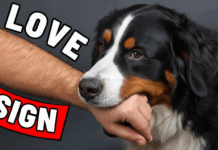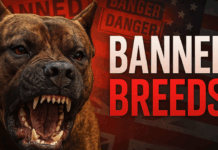Last Updated on September 21, 2024 by Dogs Vets
Fact Or Myth: Are Little Dogs More Aggressive and Yappy Than Big Dogs?
How many times have you come across a yard gate with a big dog sign, only to be met with a huge puppy happily wagging their tail at you?
Similarly, how many times have you come across a cute little Chihuahua, only to see them baring their teeth at you and looking like they want to bite you into tomorrow?
We see many people saying that little dogs are more aggressive than big dogs, but how true is that actually?
Is it true that they bark more than bigger dogs?
If so, why is that? Well, we’ll take a deeper look at the psychology of small dog behavior.
Overview of Aggression in Small vs. Large Dogs
The perception that small dogs are more aggressive and yappy than large dogs is a common belief, but research and expert opinions suggest that this stereotype is misleading. While small dogs may exhibit certain behaviors that can be interpreted as aggressive or overly vocal, the underlying factors are more complex and often tied to training, socialization, and owner behavior.
Behavioral Differences
Small Dogs’ Behavior
Research indicates that small dogs tend to be:
- Less obedient: They often do not respond as reliably to commands compared to larger breeds.
- More excitable and pugnacious: Small dogs are more likely to bark or growl at strangers and other dogs, which can be perceived as aggressive behavior.
- More anxious and fearful: They are often easily spooked by loud noises or unfamiliar situations, leading to defensive behaviors that might be interpreted as aggression.
Large Dogs’ Behavior
Conversely, large dogs are generally viewed as more stable and less prone to anxiety-driven behaviors. This perception is partly due to the fact that when large dogs exhibit aggression, the consequences can be more severe, leading to greater public concern and media attention.
Misconceptions About Aggression
The belief that small dogs are inherently more aggressive may stem from several misconceptions:
- Severity of Incidents: Aggressive incidents involving large dogs often result in more serious injuries, which garners more attention than minor incidents involving small dogs.
- Owner Behavior: Owners of small dogs may inadvertently reinforce negative behaviors by allowing their pets to act out without consequences. This inconsistency in training can lead to increased anxiety and aggression in small breeds.
Dog Size Matters
Studies show that there are some notable differences between the two, particularly in their behavior. Small dogs tend to be more anxious, which rather proves the stereotype. They are often less obedient, are more excitable, and are also slightly more fearful.
To them, barking is a form of protection. Unlike bigger dogs, they do not have their size to help them out in case they are attacked by a predator. Also, they do not have fangs as big or any other skill that can help them survive in this dog-eat-dog world.
So what do they do? They start yapping. It’s in their instinct, to create enough noise so that they seem more dangerous to their enemy. Even if the dog is safely tucked in its home, it can’t help but occasionally let that instinct out.
Fear Levels and Small Dogs
Small dogs are also bigger yappers simply because they are much more fearful. The smaller they are, the scarier the room will look to them. Something that seems insignificant to you may seem like a big threat to your small doggy.
So, if you see your little Chihuahua or Pomeranian yapping at your vacuum cleaner, it might be because it is so big and noisy, they see it as a threat that has come to end them and their family. People often joke that “they’re packed with more evil because they are lower on the ground and closer to hell” – but in fact, they are just scared.
Smaller dogs may yap more also because they were coddled as puppies. As a result, they get used to the protection, and when they no longer feel like you are around, they start feeling helpless. While they love your attention, it also deprives them of the social skills they need to get out in the world – and therefore, get past their fear.
The Role of Training and Socialization
Training plays a crucial role in a dog’s behavior regardless of size. Studies show that:
- Inconsistent Training: Owners of small dogs tend to be less consistent in their training methods, which can exacerbate behavioral issues.
- Socialization: Engaging in regular training and social activities can significantly improve obedience and reduce aggressive tendencies in both small and large dogs
Inconsistent Training and Yapping
Big dogs are considered more dangerous because they have a much stronger bite. The majority of the dog bites in areas such as Monterey, California are caused by bigger dogs – and if a smaller dog bites, it is usually not bad enough to press charges. Most Monterey dog bite lawyers say that most dog bite reports are caused by bigger breeds.
As a result, since small dogs do not deal as much damage when they snap or bite, breeders and trainers don’t make that big of an effort to pull that aggressive trait out of them. Owners don’t see it as much of a problem either. This can lead to inconsistent training – and ergo, a much more yappy and aggressive dog.
Since small dogs do not spend enough time training, they might not know how to respond to certain triggers, such as an interaction with a bigger dog or a child. They do not know what the commands are, except for perhaps a leash jerk or scolding – which can lead to an even bigger anxiety build-up. This anxiety is often greater in smaller dogs, due to their inborn fear, which can cause them to lash out.
Overall Health Level and Genes
Lastly, smaller dogs tend to be noisier and yappy simply because they were born that way. The genes of small dogs are often less desirable, which adds to their poor health. This can cause them to act very grumpy and feel overall unwell, leading to modification in the psychological area.
Evidently, not every dog receives this kind of bad gene, which is why not all small dogs are ferocious yappers. That being said, some are more predisposed to these poor health conditions, which can cause them to take their anger on the outside world.
The Bottom Line
In the end, it seems to be a fact: smaller dogs are more aggressive than bigger dogs. That being said, the rule is not set in stone. A big dog can be a sweetheart compared to a smaller dog down the block, but there are also smaller dogs that are furballs or cuteness overload compared to other bigger, aggressive dogs. This can depend on the training that the dog receives.
Final Thoughts
Proper training and consistent owner behavior can mitigate these issues across all dog sizes. Therefore, the notion that little dogs are universally more aggressive than big dogs is largely a myth shaped by perception rather than fact.
We hope you enjoyed this article… What are your thoughts?
Pls feel free to share this article!























